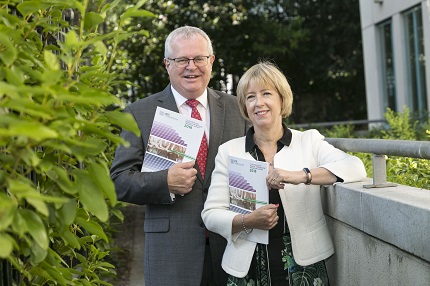28/11/2019

Innovation has always been a prized commodity in business, and for many companies based in Ireland, it is an essential part of sustaining growth. Innovation and development are recognised across industries through accolades such as the American Chamber of Commerce’s annual US-Ireland Research Innovation Awards. The traditional solution may have been to work on R&D in-house, but in recent years there has been a renewed focus in businesses in Ireland teaming up with research partners to achieve their goals.
“By talking with the right people in the research system, the result may be a collaboration between the two parties, the licensing of technology to industry, or the provision of consultancy advice to address a particular business need,” says Alison Campbell, director of Knowledge Transfer Ireland.
Knowledge Transfer Ireland aims to facilitate the connections between businesses and research partners in Ireland.
“We help businesses to benefit from access to Irish expertise and technology by making it simple to connect and engage with the research base in Ireland,” says Campbell. “Our network of technology transfer offices, located in research-performing organisations nationwide, works to establish strong relationships with businesses from SMEs to larger indigenous companies, right through to multinationals that have a presence in Ireland.”
Infant powder integrity
Recent months have seen connections through Knowledge Transfer Ireland’s offices such as global healthcare company Abbott partnering with UCC to provide consultancy services in order to design a pilot-scale conveyor system for testing infant powder integrity.
Irish organisations are also using professional learning and development services to make new connections as well, such as Glanbia’s recent collaboration with UCD on a project to transform dairy waste products into high-value bio-based products including biodegradable plastics, bio-based fertilisers and minerals for human nutrition.
“In the most practical way, we give businesses the tools, online and through our offices, to find and engage with research partners in order to drive innovation,” says Campbell. “That might range from how to draft and negotiate legal agreements through to information on the duties of company directors and observers.”
‘Repeat engagements’
The spirit of collaboration seems to be catching, as more businesses move toward working with research partners year on year, according to research from KTI. “Repeat engagements between businesses and the third level, including research centres, around Ireland have increased by almost 20 per cent on the same time last year,” says Campbell. “So clearly businesses are benefiting significantly from what they are accessing, be it via IP, collaboration or consultancy.”
As the number of foreign direct investment companies establishing in Ireland increases, it seems pertinent to offer them an easy way to connect with other businesses, and with university research partners here, suggests Campbell.
“Externalising research is increasingly relevant to companies. It allows them to access skills and resources that they don’t have in-house, to dip their toes into the water in new areas and to access the brightest of minds,” she says.
“Networking with other companies is also on the rise. One of the successes of the Enterprise Ireland Technology Centres is in companies coming together to address R&D topics of mutual interest and leveraging the knowledge and capabilities in the universities and institutes to work with them to deliver to these.”